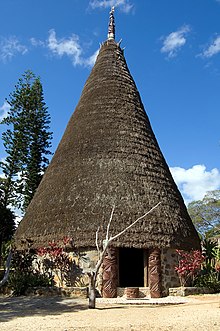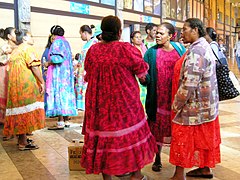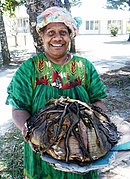Kanak (people)

Kanaks are Melanesian indigenous people in New Caledonia (Southwest Pacific), where they make up 45% of New Caledonia's population. The word comes from kanaka maoli , a Hawaiian term for "man" ( kanaka ), which in the past was often used by European explorers, traders and missionaries of Oceania for all non-European islanders. Before the European discovery, there was no unified state in New Caledonia and accordingly no comprehensive self-designation for the inhabitants. Many Kanaks continue to cultivate their own languages and customs in their ethnic groups. Around 25 Kanak languages are still used in the various people's areas today.
Also in France, the former colonial power of these areas, the numerous immigrants from there call themselves or are called Kanak or canaque .
Personalities
- Ataï , chief of the Kanaks, led Kanaks militarily against French. Occupier
- Jean-Marie Tjibaou , French Politician, independence leader of New Caledonia
- Eloi Machoro
- Christian Karembeu (* 1970), French Soccer player
- Denise Tiavouane , artist
Crafts of the Kanak
tradition
Trivia
The Kanake Oofty-Oofty is the fictional character of a sealer who is part of the crew on the schooner “Ghost” in the multi-part adventure “ The Sea Wolf ” based on the novel by Jack London .
Term as a swear word
Often in the German-speaking area people categorized as foreign were and are disparagingly referred to as "Kanaks" , but meanwhile some foreign young people boast of this word, especially in German youth jargon .
Web links
Individual evidence
- ↑ see kanaka in Hawaiian Dictionaries
- ↑ Deutsches Kolonial-Lexikon (1920), Volume II, p. 223







